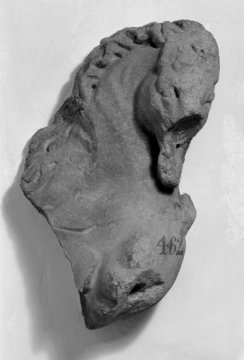Explore Collections


You are here:
CollectionsOnline
/
Furniture, or possibly sarcophagus, fragment: forepart of a Pegasos
Browse
Furniture, or possibly sarcophagus, fragment: forepart of a Pegasos
Island Marble
Height: 25cm
Width: 17cm
Width: 17cm
Museum number: M462
On display: Sepulchral Chamber
All spaces are in No. 13 Lincoln's Inn Fields unless identified as in No. 12, Soane's first house.
For tours https://www.soane.org/your-visit
Curatorial note
Identified as a Pegasos [Latin: Pegasus], the winged horse of Greek mythology, by the remains of the base of the right wing behind the right foreleg. The left leg was raised as if the animal were intended to be pawing the air or in flight, and the head was turned to the right. The nature of this broken sculpture might suggest origin as a carved furniture support.
An alternative identification is to suggest derivation from a large striated sarcophagus, one of the paired protomai of beasts which appear at the left and right on the principal sides and emerge directly from the striated surface. They are the immediate ancestors of the animals-tearing-weaker-prey which in the Third Century fill the curved ends of a number of this class of sarcophagi. Compare the protomai of horses and a panther (?) on a sarcophagus found near the tomb of Cecilia Metella in the reign of Pope Paul III, Farnese (1534 - 1549) and later in the courtyard of the Palazzo Farnese in Rome1.
1 G.B. Piranesi, Le Antichità Romane, Fol., Rome, 1784, III, pl. LII; P. Gusman, L'Art décoratif de Roma de la fin de la république au IV siécle, 2 vols, Paris, 1910, I, pl. 40; J.M.C. Toynbee and J.B.W. Perkins, in Papers of the British School at Rome, 1950, XVIII, p.21, Severan period; cp. also pl. XII, 1.
An alternative identification is to suggest derivation from a large striated sarcophagus, one of the paired protomai of beasts which appear at the left and right on the principal sides and emerge directly from the striated surface. They are the immediate ancestors of the animals-tearing-weaker-prey which in the Third Century fill the curved ends of a number of this class of sarcophagi. Compare the protomai of horses and a panther (?) on a sarcophagus found near the tomb of Cecilia Metella in the reign of Pope Paul III, Farnese (1534 - 1549) and later in the courtyard of the Palazzo Farnese in Rome1.
1 G.B. Piranesi, Le Antichità Romane, Fol., Rome, 1784, III, pl. LII; P. Gusman, L'Art décoratif de Roma de la fin de la république au IV siécle, 2 vols, Paris, 1910, I, pl. 40; J.M.C. Toynbee and J.B.W. Perkins, in Papers of the British School at Rome, 1950, XVIII, p.21, Severan period; cp. also pl. XII, 1.
Unrecorded.
Literature
G. B. Piranesi, Le Antichitè Romane, Fol., Rome, 1784, III, pl. LII.
P. Gusman, L'Art décoratif de Roma de la fin de la république au IV siécle, 2 vols, Paris, 1910, I, pl. 40.
J. M. C. Toynbee and J. B. W. Perkins, in Papers of the British School at Rome, 1950, XVIII, p.21, Severan period.
P. Gusman, L'Art décoratif de Roma de la fin de la république au IV siécle, 2 vols, Paris, 1910, I, pl. 40.
J. M. C. Toynbee and J. B. W. Perkins, in Papers of the British School at Rome, 1950, XVIII, p.21, Severan period.
Soane collections online is being continually updated. If you wish to find out more or if you have any further information about this object please contact us: worksofart@soane.org.uk


